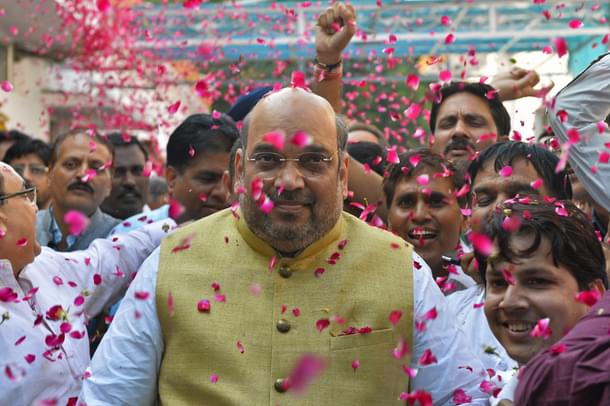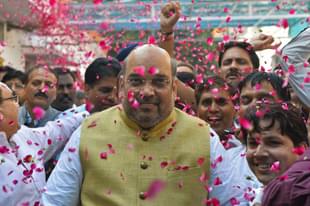Politics
Uttar Pradesh: Why Amit Shah Is Going After The Dalit Vote
Atul Chandra
Jun 01, 2016, 04:46 PM | Updated 04:46 PM IST
Save & read from anywhere!
Bookmark stories for easy access on any device or the Swarajya app.


When Bharatiya Janata Party’s national president Amit Shah had lunch with Dalits and Other Backward Caste (OBC) persons in Varanasi on May 31, it wasn’t his first attempt to wean Dalit votes away from Mayawati.
Nor would it be his last. He is scheduled to address a conference of Scheduled Castes at Lucknow on June 4. Shah had earlier gone to Ujjain where he took a dip in the Kshipra along with Dalit seers.
With elections to Uttar Pradesh Assembly drawing closer, BJP’s Chanakya is expected to make more such moves to repeat its 2014 performance when the party romped home by winning 71 of the 80 parliamentary seats leaving the BSP to fiddle with zero.
In terms of votes, BJP’s share was a whopping 42.3 per cent and that of BSP, nearly 20 per cent.
The pro-Dalit overtures, along with the decision to appoint Keshav Prasad Maurya, an OBC, as the state party chief are clearly aimed at pressing ahead with the vote share advantage of 2014. Both Dalits and OBCs are, therefore, much more crucial for the BJP than the upper caste voters who are its traditional supporters.
Even before Amit Shah’s decision to bathe with Dalit seers at the Kumbh, the party had announced the development of five places as Panchteerth in honour of Babasaheb Bhim Rao Ambedkar. The Panchteerth include Ambedkar’s birth place in Mhow, the place where he stayed in London during his student days, ‘Deeksha bhoomi’in Nagpur where he got his education, Mahaparinirvan Sthal in Delhi and Chaitya bhoomi in Mumbai.
Then on April 5, 2016, Prime Minister Narendra Modi had launched the Stand Up India scheme in Noida. The scheme can help promote entrepreneurship among Scheduled Castes and women by giving them loans ranging from Rs 10 lakh to Rs 1 crore to start new ventures.
It was not a coincidence that the PM chose the birth anniversary of Babu Jagjivan Ram, who was a Dalit face of the Congress party for years, to kick-start the scheme.
BJP spokesperson Vijay Pathak explained why the party was going all out to win over Dalits. “In the 2014 Lok Sabha elections, Mayawati could not win even a single seat from the state. If Dalits reposed faith in the party and voted for Prime Minister Narendra Modi, we have to ensure that we live up to their expectations.”
The unheralded Keshav Prasad Maurya’s appointment as state president was BJP’s move to tackle its twin adversaries in the state. With only Yadavs getting all the goodies backward castes are miffed with the Samajwadi Party which is also banking on Muslim support, despite not having nominated any Muslim to either the Rajya Sabha or the legislative council.
The BJP’s offensive for Dalit votes has to be seen in the context of a pre-poll survey conducted a few months back, purportedly by the state intelligence department. The survey had placed BSP at number one position with BJP at number two and an electoral drubbing for the ruling party.
As Dalits and OBCs take the centre-stage Brahmins, who comprise nearly 12 per cent of the vote bank, seem to have been pushed back stage. The perception, says Pathak, is wrong. He said that compared to the BSP where Satish Mishra, the so-called Brahmin face, distributed as many laal battees as he possibly could to his kin the BJP has given prominence to many Brahmin leaders.
The BSP is, obviously, not going to be a meek opponent. When Amit Shah was taking a dip in the Kshipra with Dalit seers, a Bahujan Samaj Party (BSP) legislator from Ballia’s Rasra constituency was there with two trainloads of pilgrims. His 7000- strong contingent comprised mostly of upper caste pilgrims.
Whether the holy waters of Kshipra have washed away the smudges of casteism to help the BJP win this politically crucial state together with the OBC support remains to be seen. What is clear, however, is that the party does not want to goof up on its caste arithmetic.
Atul Chandra is former Resident Editor, The Times of India, Lucknow. He has written extensively on politics in Uttar Pradesh.




